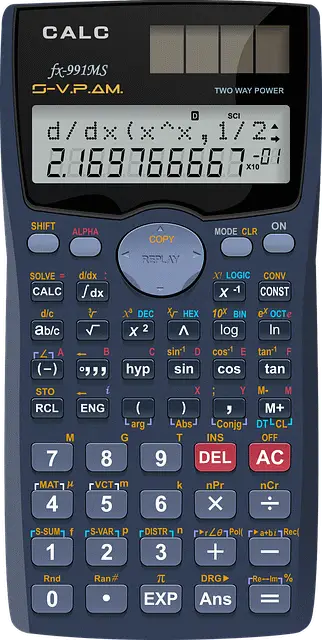
|
Calculator Library |

|
||
| Home » 87 Calculators » Blog » What Is A Non-Programmable Calculator? | ||||
WHAT IS A NON-PROGRAMMABLE CALCULATOR?
About Non-Programmable CalculatorsNon-programmable calculators are the simplest type of calculator available. They are designed to perform basic mathematical operations, such as addition, subtraction, multiplication and division. These scientific calculators can also perform complex tasks, such as trigonometry, calculus and statistics. Non-programmable calculators are not able to store information or be programmed to perform specific tasks. This makes them less versatile than programmable calculators, which can be programmed to perform a wide range of tasks. However, non-programmable calculators are often smaller and cheaper than their programmable counterparts. Who Uses Non-Programmable Calculators?
Non-programmable calculators can be a good choice for people who need a basic calculator for everyday use. These calculators are typically small and lightweight, making them easy to carry around. Benefits of Non-Programmable CalculatorsNon-programmable calculators have several advantages over their programmable counterparts. They are usually smaller and lighter, making them easy to carry around. Non-programmable calculators also tend to be cheaper than programmable calculators. Additionally, these calculators are simple to use and require no programming knowledge. Drawbacks of Non-Programmable CalculatorsAlthough non-programmable calculators have several benefits, they also have some drawbacks. These calculators are less versatile than programmable calculators and cannot be programmed to perform specific tasks. Additionally, non-programmable calculators often lack features that are found in more advanced scientific calculators, such as graphing capabilities. Programmable Vs. Non-Programmable CalculatorsScreen SizeA non-programmable calculator will usually have a smaller screen than a programmable calculator because it doesn’t need to display as much information. PriceNon-programmable calculators are typically cheaper than programmable calculators because they have fewer features. Size and WeightNon-programmable calculators are usually smaller and lighter than programmable calculators because they don't need to include a keyboard or other input devices. FeaturesNon-programmable calculators can perform basic mathematical operations, while programmable calculators can be programmed to perform a wide range of tasks. Additionally, programmable calculators often have more features than non-programmable calculators, such as the ability to graph equations. ConnectivityNon-programmable calculators are not able to connect to other devices, while programmable calculators can often be connected to computers and other peripherals. Firmware UpdateNon-programmable calculators cannot have their firmware updated, while programmable calculators can often be updated with new features and capabilities. Display and User InterfaceNon-programmable calculators typically have a simpler display and user interface than programmable calculators. This is because they don't need to display as much information or provide a way to input programs. As you can see, there are several key differences between programmable and non-programmable calculators. When deciding whether to purchase a programmable or non-programmable calculator, it's important to consider what type of tasks you'll be using the calculator for. If you need a scientific calculator for complex tasks, such as trigonometry or calculus, a non-programmable calculator is a good choice. However, if you need a calculator that can be programmed to perform specific tasks, such as graphing or statistical analysis, a programmable calculator is a better option. Best Non-Programmable CalculatorsHere are some of the best non-programmable calculators on the market: - Texas Instruments TI-30: TI-30 scientific calculator is ideal for students and professionals who need a versatile calculator for complex tasks. - Casio fx-115ES PLUS: This scientific calculator is perfect for people who need a durable and reliable calculator. - Sharp ELW516XBSL: This graphing calculator is ideal for students and professionals who need a powerful tool for graphing and statistical analysis. - HP 35s: This scientific calculator is perfect for people who need a versatile and easy-to-use calculator. If you're looking for a non-programmable calculator, any of the calculators on this list would be a great choice. However, it's important to consider what type of tasks you'll be using the calculator for before making a purchase. Best Programmable CalculatorsHere are some of the best programmable calculators on the market: - Texas Instruments TI-84 Plus CE: This graphing calculator is perfect for students and professionals who need a powerful tool for graphing and statistical analysis. - Casio fx-9860GII SD: This graphing calculator is ideal for people who need a durable and reliable calculator. - Sharp EL-9900: This scientific calculator is perfect for people who need a versatile and easy-to-use calculator. - HP 50g: This graphing calculator is perfect for students and professionals who need a powerful tool for graphing and statistical analysis. ConclusionIf you're looking for a calculator, it's important to decide whether you need a programmable or non-programmable model. Programmable calculators are more versatile and have more features than non-programmable calculators, but they are also more expensive.
|
|
|||
Copyright © Calculator Library, 1998 - 2026. Made with ♥ in Australia. |
||||
 A calculator is a device that performs mathematical operations, usually including addition, subtraction, multiplication and division. Non-programmable calculators are those which cannot be programmed to perform specific tasks or calculations. They are the most basic type of calculator and are useful for general arithmetic purposes.
A calculator is a device that performs mathematical operations, usually including addition, subtraction, multiplication and division. Non-programmable calculators are those which cannot be programmed to perform specific tasks or calculations. They are the most basic type of calculator and are useful for general arithmetic purposes. Non-programmable calculators are most commonly used by students and professionals who need to perform basic mathematical operations. These calculators are also popular with people who need a scientific calculator for complex tasks, such as trigonometry or calculus. Non-programmable calculators are often used in classrooms and offices, as they are simple to use and relatively inexpensive.
Non-programmable calculators are most commonly used by students and professionals who need to perform basic mathematical operations. These calculators are also popular with people who need a scientific calculator for complex tasks, such as trigonometry or calculus. Non-programmable calculators are often used in classrooms and offices, as they are simple to use and relatively inexpensive.